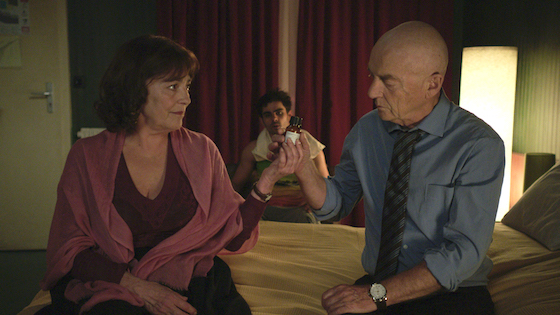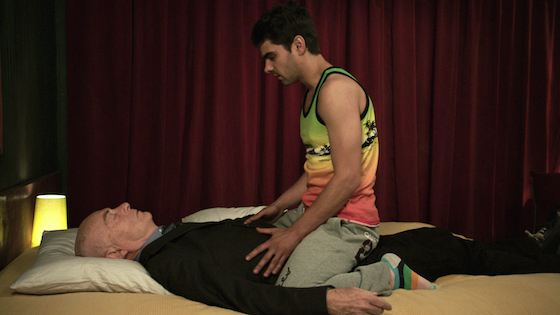[Rock Fist Way Up]
 Director Lionel Baier has done something very special with his newest film, Vanity (La Vanité): he’s made a movie about suicide that is simultaneously funny, poignant, and heartbreaking. Quirky without veering into kitsch, and stocked with characters that are both unique and familiar, Vanity does a lot with a little, and tells a touching story that packs one hell of a punch in just 75 short minutes. And while a less skilled director might have had trouble crafting a picture with fully explored characters within a story this confining, Baier does masterful work pulling the audience in, and taking them through the full, completely realized arcs of those involved.
Director Lionel Baier has done something very special with his newest film, Vanity (La Vanité): he’s made a movie about suicide that is simultaneously funny, poignant, and heartbreaking. Quirky without veering into kitsch, and stocked with characters that are both unique and familiar, Vanity does a lot with a little, and tells a touching story that packs one hell of a punch in just 75 short minutes. And while a less skilled director might have had trouble crafting a picture with fully explored characters within a story this confining, Baier does masterful work pulling the audience in, and taking them through the full, completely realized arcs of those involved.
At the center of Vanity is David (Patrick Lapp), a widowed architect in his early seventies who has brain cancer, and is suffering. Although he’s purposefully vague about how serious his condition is, David makes no qualms about the fact that he is indeed dying, and painfully so. As a result, he hires a medical service to help him pass on with a little dignity, and arranges for his end to take place at a motel that he and his deceased wife designed back in the 1960s. Perched on a ridge overlooking Lausanne, Switzerland, the motel is a shadow of the slick hot spot it once was, which is a theme Baier deftly comes back to several times throughout the course of Vanity.
Once he arrives at the motel, David meets a woman from the euthanasia company to discuss the process, and to prepare for his “exit” that evening. This lady, Esperanza (Carmen Maura), explains that she has never actually assisted with one of these procedures before, and while she’s familiar with the process, she needs a witness present to attest to the voluntary nature of the ordeal. When David’s son refuses to participate, and leaves shortly after arriving, David turns to the only other option available: the male prostitute working the room next door.
The stage is thus set for David to die on his own terms: alone, with strangers, and in a place that is itself on the brink of nonexistence. A funny thing happens, though; David begins to connect with Esperanza and the hooker, Treplev (Ivan Georgiev), and rediscovers a need to belong he’d abandoned some time ago. As David, Esperanza, and Treplev learn more about each other, and find some common ground amongst their varied backgrounds, genuine connections begin to form. Vanity takes place over the course of just one winter evening, so this must all come to pass in a very confined time and place, yet somehow, Baier makes it all feel exceptionally natural, and real. All three characters are wounded and damaged, yet in each other, they are surprised to find a measure of solace that’s been eluding them.
Baier co-wrote the script for Vanity, and much of the credit for the organic evolution of these characters starts with what is on the page. These people don’t speak a whole lot, but when they do, what they say reveals a wealth of information about who they are, were, and want to be. What’s most striking is what Baier manages to reveal without a word being spoken, however. On several occasions, as David looks over the motel’s grounds, what it once was transposes itself on top of the reality. It is a striking visual, and it acts as a fitting metaphor for a man at the end of his mortal rope, reflecting on a life that used to be vibrant and full of promise. The fact that Vanity takes place in December and entirely at night is no accident, just as the muted colors and dim lighting in the hotel aren’t. David is in a dark place, literally and figuratively, and when Vanity does take a break from the scenes in the present-day motel via these flashbacks, everything looks and feels notably brighter.
Vanity doesn’t take any shortcuts when it comes to the emotional work David, Esperanza, and Treplev have to put in, yet somehow the film remains breezy and fun. It is a credit to the actors as well as the director that a picture with such serious tones is as light on its feet as this one is. Without giving too much away, David finds himself humbled after opening up to Esperanza and Treplev, who themselves learn that David is more than just a depressed, fading, shadow of a man. In time, they all learn how to help each other, and to heal, and it is a beautiful thing to behold.
To say much more wouldn’t necessarily spoil any plot developments, but it might hinder a viewer from going through the journey with fresh eyes and a lack of expectations…and that would be a shame. Vanity is an understated, patient, and thoughtful masterpiece that harkens back to the work of Hal Ashby, Wes Anderson, and Noah Baumbach with its tone and visual aesthetic. It shows instead of tells, and never pushes the audience too hard when trying to make a point. Currently playing at the Seattle International Film Festival, Vanity is by far the best film playing there right now, and shouldn’t be missed by anyone who has 75 minutes to spare on a truly remarkable cinematic experience.







Comments on this entry are closed.